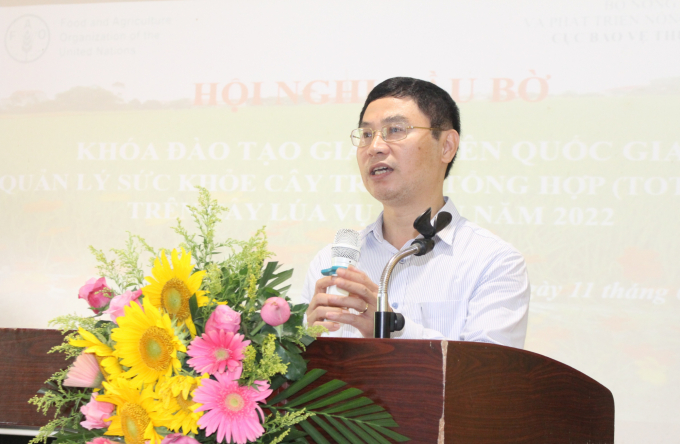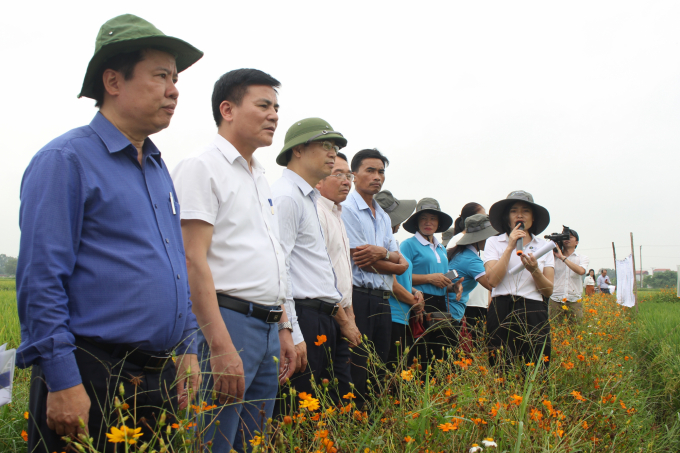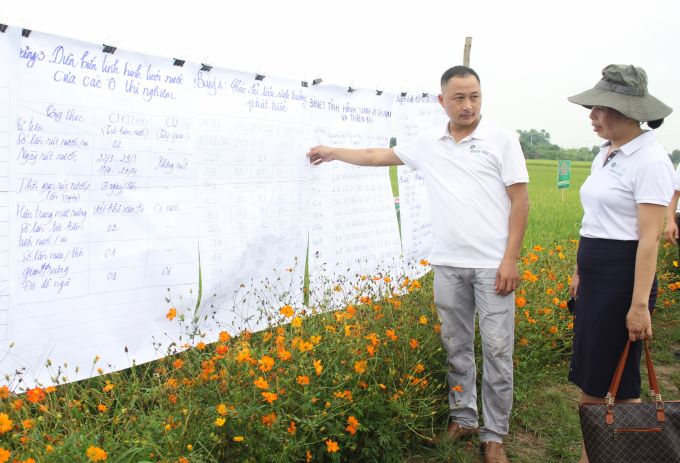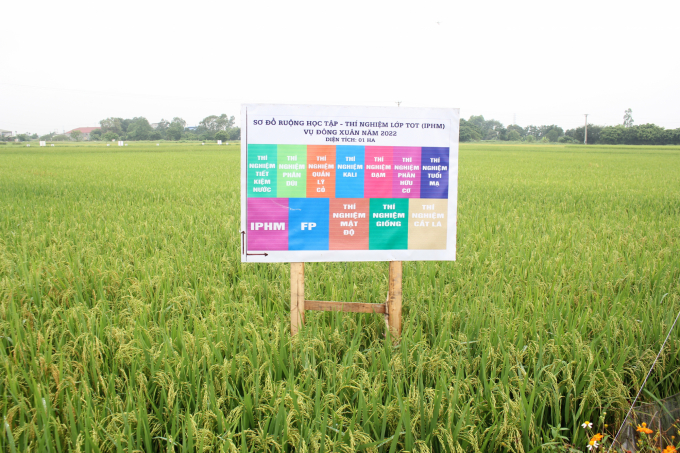May 16, 2025 | 10:06 GMT +7
May 16, 2025 | 10:06 GMT +7
Hotline: 0913.378.918
May 16, 2025 | 10:06 GMT +7
Hotline: 0913.378.918
On June 11, the Department of Plant Protection held a workshop on the training of trainers on integrated crop health management (TOT-IPHM) to be implemented on the 2022 spring rice crop. The worksop was held in Viet Hung commune, Van Lam district, Hung Yen province.
According to the Northern Plant Protection Center, the TOT-IPHM training program takes place over a period of 115 days with the following schedule: 5 days a week at the Northern Plant Protection Center and 1 day of practical training for the FFS farmer training class.

Mr. Nguyen Quy Duong, Deputy Director of the Department of Plant Protection highly commended the efforts and achievements of the TOT-IPHM. Photo: Trung Quan.
Through discussion, exchange, and practice, the trainees were equipped with knowledge of rice planting, nurture and physiological techniques throughout the rice development stages. The training course also helps trainees understand the methods of investigating and analyzing the rice field ecology, observing and recording the growth and development indicators, monitoring the density and rate of the pests and diseases, thereby proposing appropriate management solutions.
In addition, trainees are provided with basic information on pesticides including indicators to assess the pesticide's toxicity; impacts on human health and ecological environment; How to select, use and store to minimize the risks posed by pesticides and so on.
A special feature in the training program is that the trainees can use IPHM knowledge to conduct experiments on 1 hectare of rice in Viet Hung commune (Van Lam) in the 2022 spring crop. The rice variety used in these crops include Dai jasmine 8 and Bac jasmine 7.
The pilot model focuses on assessing the effects of farming practices; sowing density; microbial organic fertilizers; dosage of potassium, protein fertilizer; alternating wet - dry irrigation measures; weed management, harmful organisms, beneficial organisms and rice yield.
Results show that the rice areas cultivated following the IPHM model grow and develop exceptionally well, the improved land becomes porous, the density of natural enemies increases, the rate of pests and diseases is low, the amount of seed use reduced by 30%, pesticides by 25%, nitrogen by 30%, 2 times of watering/crop, yield increased by 2.4 quintals/ha, profit was higher than 7 million dong/ha.. . compared with the control field cultivated by traditional methods.
Mr. Nguyen Van Ly, Secretary of Viet Hung Communal Party Committee shared: Viet Hung is a purely agricultural commune with a rice area of over 393 hectares. Scientific and technical advances application in production is the only way to improve productivity and increase profits for farmers. Access to IPHM advanced farming model is an opportunity for farmers to gradually change their farming habits from focus on inputs to more sustainable values.

Delegates visiting and evaluating the results of the IPHM model on 2022 spring rice crop deployed in Viet Hung (Van Lam). Photo: Trung Quan.
According to Mr. Ly, the results obtained from the IPHM areas are entirely compatible with the land in the commune and they can increase production value for farmers. Consequently, the commune will encourage farmers to expand their farming areas following this new method for the next crop; with the aim to implement the model across the entire commune.
Mr. Bui Duc Thang, Me Dau village, Viet Hung commune (Van Lam), a trainee of the FFS class shared: I was initially hesitant approaching the IPHM method, I was even skeptical because the farming practices are different from that of traditional methods such as: transplanting young seedlings, transplanting at a density of 30 clusters/m2 (less than the traditional method); lower amount of fertilizers and pesticides; draining water from the field; early weeding by hand, etc.
However, after being analyzed and answered by the lecturers of TOT-IPHM training program and experts, he applied the model to his family's 4 sao of rice cultivation. The results were not surprising when the entire cultivated area under the IPHM method grew and developed exceptionally well, the tillering speed was fast, the branches were more effective, pests and diseases were less common, the yield and output increased, production costs were lower compared to the previous traditional cultivation method.

Trainees of TOT-IPHM pilot program closely monitors factors in order to drastically reduce input costs for production. Photo: Trung Quan.
“At first, I didn't understand what IPHM was, then after I learned and understood it, I attempted again to find myself very invested. The cost of pesticides has been reduced by half, and the total cost of materials has been cut by 1/3 compared to the previous method, the rice yield is estimated at 3 quintals/sao; while previously it was only 2.5 - 2.6 quintals/sao. That's very promising", Mr. Thang said excited.
Mr. Nguyen Quy Duong, Deputy Director of the Department of Plant Protection highly commended the efforts and achievements of the TOT-IPHM.
“The greatest success of the program is that the trainees have mastererd the basic principles of IPHM. In addition, the training program has organized 5 FFS training classes to improve farmers' knowledge and cultivation capacity. So that when they applied this method to their fields, rice plants will grow and develop healthily, the quantity of seeds, fertilizers, water, pesticides will decrease. This is a promising sign in face of the current high prices of input materials” said Mr. Duong proudly.
According to Mr. Duong, Vietnam is a leading countries in accessing and implementing IPHM models. Therefore, the highest requirement for each trainee participating in the training program is to master, understand, and thoroughly answer the question: What are the similarities, differences between IPHM and previously implemented IPM models?
Mr. Duong reminded the Training Management Board to urgently gather statistics on challenges, difficulties and obstacles when implementing IPHM in practice to promptly adjust accordingly.

The rice areas cultivated following the IPHM model grew and developed exceptionally well, the amount of seed used decreased by 30%, amount of pesticides decreased by 25%, amount of nitrogen decreased by 30%. Photo: Trung Quan.
Regarding the local government, Mr. Duong expressed his wish that the government of Viet Hung commune as well as other localities will pay attention and establish guidelines, policies to encourage farmers to replicate the IPHM model. Major organizations such as the Women's Union, the Farmers' Union, the Youth Union will be the nucleus in informing, disseminating and encouraging their members to acomplish such tasks.
"For the members of the FFS class, they will continue to apply their acquired knowledge in their fields. Additionally, trainees need to actively share and spread the benefits of the program to the masses to develop production towards building a strong IPHM community.
Each farmer will be the most effective promoter in spreading the benefits of the model. We had a generation of farmers promoting IPM 30 years ago, and now we must also build a new generation of promoters for IPHM”, Mr. Nguyen Quy Duong expressed his wishes.
Translated by Nguyen Hai Long

(VAN) Cold-barn systems efficiently manage environmental and temperature conditions, which aids in the prevention of respiratory diseases in pigs and protects them from the vectors that transmit African swine fevers.

(VAN) To tackle challenges, the project 'Addressing key technical bottlenecks in the grouper supply chain in Vietnam' has been underway since 2024.

(VAN) The project 'Disease-Resilient and Sustainable Cassava Production Systems in the Mekong Region', funded by the Australian Center for International Agricultural Research (ACIAR), is being implemented from 2024 to 2028.

(VAN) Data from 10,000 farming households will help professionalize production organization and support the implementation of the One Million Hectares Program for High-Quality, Low-Emission Rice Cultivation.

(VAN) FAO Director-General QU Dongyu marks International Day of Plant Health at NENA conference.

(VAN) Deputy Minister of Agriculture and Environment Hoang Trung affirmed that floriculture and ornamental plants are a growing industry that receives significant global attention.

(VAN) The three staple crops dominating modern diets – corn, rice and wheat – are familiar to Americans. However, fourth place is held by a dark horse: cassava.